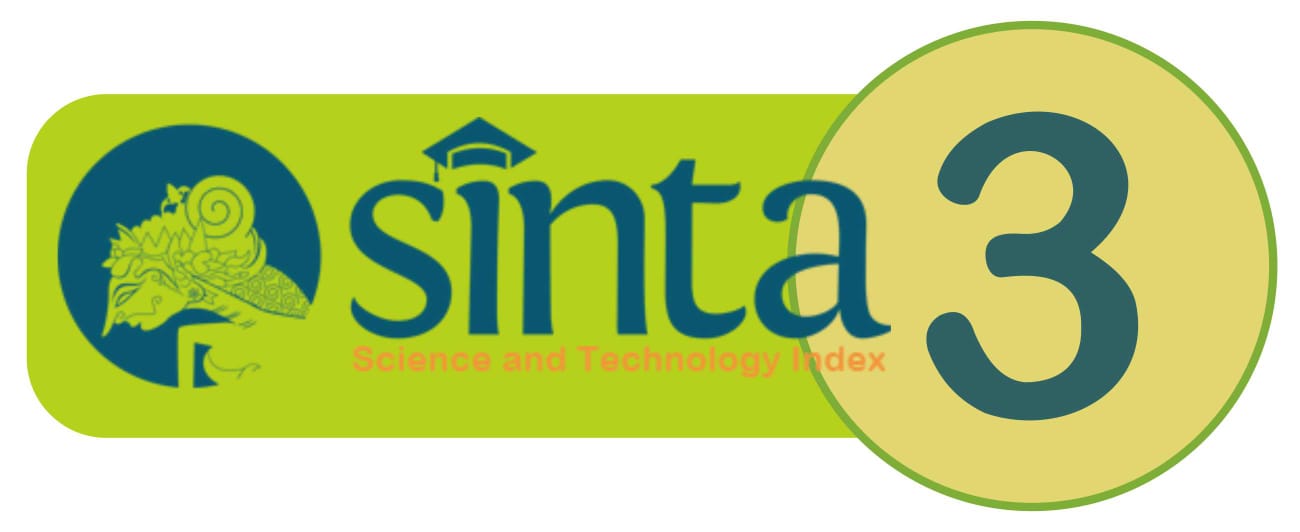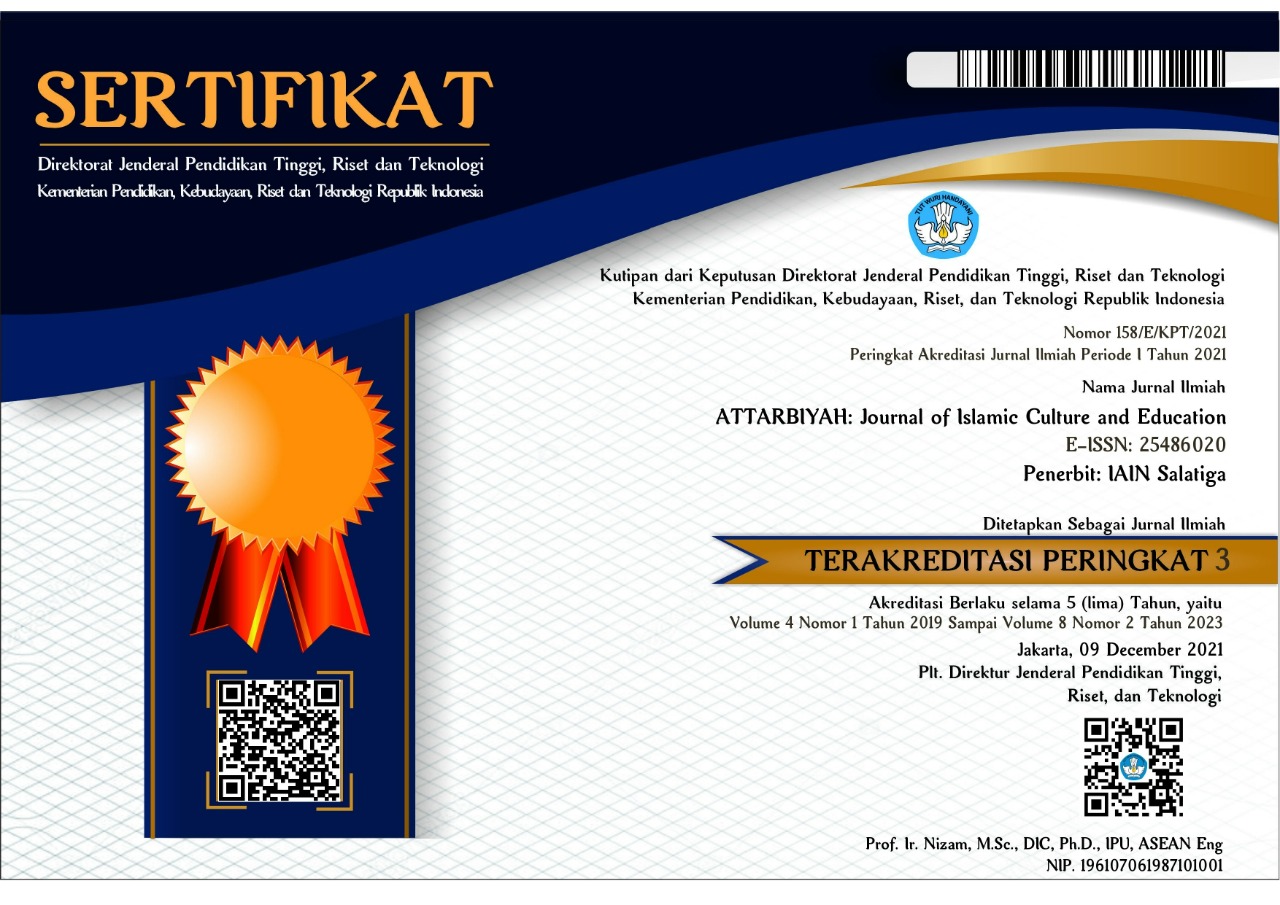Al-jabiri's traces in m. amin abdullah's idea about integrative-interconnective paradigm for higher education
Abstract
Between Islamic science and science, according to M. Amin Abdullah, it should not be dichotomous and lack a strong epistemological basis. For this purpose, the work of "integrating" is not enough, because the problem is the difficulty of combining the disciplines of Islam and science, which sometimes do not get along well and in both there is a potential to crush one another. Therefore, according to him, integration efforts must be followed by interconnection efforts of science. This idea from him emerged after he recontextualized M. Abed Al-Jabiri's thoughts, especially those related to the criticism of Arabic reasoning and the rethinking of epistemology. The results were brilliant. The integrative-interconnective paradigm of Islamic studies in Higher Education which he initiated is considered successful in offering a kind of worldview that is more actual, open, and builds a non-dichotomic scientific bridge in higher education. As developed by UIN Sunan Kalijaga Yogyakarta at this time. This focus is what the author wants to discuss, and for that the author explores mainly all primary literature both written by Abdullah and from the relevant Al-Jabiri, approaches it historically-philosophically and then provides descriptive analysis.
Keywords
Full Text:
PDFReferences
Abdullah, M. A. (2002). Tafsir Baru Studi Islam dalam Era Multikultural. Yogyakarta: Panitia Dies Natalis UIN Sunan Kalijaga Yogyakarta & Kurnia Alam Semesta.
Abdullah, M. A. (2003). Menyatukan Kembali Ilmu-Ilmu Agama dan Umum; Upaya Mempertemukan Epistemologi Islam dan Umum. Yogyakarta: SUKA Press.
Abdullah, M. A. (2006). Islamic Studies di Perguruan Tinggi: Pendekatan
Integratif-Interkonektif (Cet. 1). Yogyakarta: Pustaka Pelajar.
Abdullah, M. A. (2007). Re-Strukturisasi Metodologi Islamic Studies Mazhab Yogyakarta. Yogyakarta: SUKA Press.
Al-Jabiri, M. ʻAbid. (1989). Isykaliyat al-Fikr al-’Arabi al-Muashir. Beirut: Markaz Dirāsāt al-Waḥdah al-‘Arabīyah.
Al-Jabiri, M. ʻAbid. (1991). Bunyah al-Aql al-‘Arabi: Dirasah Tahliliyah Naqdiyah li Nudzum al-Ma’rifah fi al-Tsaqafah al-‘Arabiyah. Beirut: al-Markaz al-Tsaqafi al-Arabi.
Al-Jabiri, M. ʻAbid. (1994). Qadlaya al-Fikr al-’Arabi: Al-Mas’alah al-Tsaqafiyah (Vol. 1). Beirut: Markaz Dirasat al-Wahdah al-’Arabiyah.
Al-Jabiri, M. ʻAbid. (1995). Al-‘Aqlu As-Siyasi al-Arabi: Muhaddidah wa Tajalliyah. Bayrūt: Markaz Dirāsāt al-Waḥdah al-‘Arabīyah.
Al-Jabiri, M. ʻAbid. (2014). Takwīn al-ʻAql al-ʻArabī (Vol. 1). Beirut: Markaz Dirāsāt al-Waḥdah al-‘Arabīyah.
Arfan, A. (2010). Fiqh al-Siyasah al-Jabiri: Analisis Kitab al-‘Aql al-Siyasi al-’Arabi (Nalar Politik Arab). Journal de Jure, 2(1). https://doi.org/10.18860/j-fsh.v2i1.56.
Barizi, A. (2011). Pendidikan Integratif: Akar Tradisi dan Integrasi Keilmuan Pendidikan Islam. Malang: UIN Maliki Press.
Baso, A. (2000). Al-Jabiri, Eropa, dan Kita. Jakarta: Pustaka Afid.
Boisard, M. A. (1988). Humanism in Islam. Indianapolis, Ind: American Trust Publications.
Boullata, I. J. (1990). Trends and issues in contemporary Arab thought. Albany, N.Y: State University of New York Press.
Diu, A. (2018). Pemikiran M. Amin Abdullah tentang Pendidikan Islam dalam Pendekatan Integrasi-Interkoneksi. Jurnal Ilmiah Al-Jauhari: Jurnal Studi Islam dan Interdisipliner, 3(1), 1–15. https://doi.org/10.30603/jiaj.v3i1.682.
Edwards, P. (1972). History of Epistemology. in The Encyclopedia of Philosophy. New York: MacMillan and the Free Press.
Faisol, M. (2010). Struktur Nalar Arab-Islam Menurut Abid Al-Jabiri. Tsaqafah, 6(2), 335. https://doi.org/10.21111/tsaqafah.v6i2.124.
Harre. R. (1978). The Philosophies of Science: An Introductory Survey. London: Oxford University Press.
Kahmad, D. (2014, Juli 12). Zikir dan Amal Saleh. Retrieved from Republika's website: https://republika.co.id/berita/koran/halaman-1/14/07/12/n8l5ie-zikir-dan-amal-saleh.
Mugiono, M. (2015). Konstruksi Pemikiran Islam Reformatif M. Abed Al-Jabiri. TAJDID: Jurnal Ilmu Ushuluddin, 14(2), 203–222. https://doi.org/10.30631/tjd.v14i2.26.
Musliadi. (2014). Epistemologi Keilmuan dalam Islam: Kajian Terhadap Pemikiran M. Amin Abdullah. Jurnal Ilmiah Islam Futura, 13(2), 160. https://doi.org/10.22373/jiif.v13i2.69.
Riyanto, W. F. (2013). Integrasi-Interkoneksi Keilmuan: Biografi Intelektual M. Amin Abdullah (1953-...). Yogyakarta: SUKA Press.
Rohmanu, A. (2014). Kritik Nalar Qiyasi al-Jabiri: Dari Nalar Qiyasi Bayani ke Nalar Qiyasi Burhani. Ponorogo: STAIN Ponorogo Press.
Ro’uf, A. M. (2018). Kritik Nalar Arab Muhammad Abid Al-Jabiri. Yogyakarta: LKiS.
Syafrin, N. (2004). Kritik Terhadap “Kritik Akal Islam” Al-Jabiri. Islamiya, 1(2).
Syah, M. A. A., & Mappiase, S. (2001). Kritik Akal Arab; Pendekatan Epistemologi Terhadap Trilogi Kritik Al-Jabiri. Dalam M. A. A. Syah (Ed.), Mosaik Pemikiran Islam Timur Tengah. Bandung: Mizan.
Washil, I. (2013). Dilema Tradisi dan Modernitas: Telaah Atas “Kritik Nalar Arab” Muhammad Abed Al-Jabiri. Jurnal Khatulistiwa: Journal of Islamic Studies, 3(2), 101–122. http://jurnaliainpontianak.or.id/index.php/khatulistiwa/article/view/216.
Waston. (2016). Pemikiran Epistemologi Amin Abdullah dan Relevansinya Bagi Pendidikan Tinggi di Indonesia. Profetika: Jurnal Studi Islam, 17(01), 80. https://doi.org/10.23917/profetika.v17i01.2102.
Wijaya, A. (2004). Menggugat Otensitas Wahyu Tuhan; Kritik Atas Nalar Tafsir Gender. Yogyakarta: Safiria Insania Press.
DOI: https://doi.org/10.18326/attarbiyah.v5i1.60-79
Refbacks
- There are currently no refbacks.

ATTARBIYAH: Journal of Islamic Culture and Education by http://attarbiyah.iainsalatiga.ac.id/ is licensed under a Creative Commons Attribution-ShareAlike 4.0 International License
----------------------------------------------------------
ATTARBIYAH : Journal of Islamic Culture and Education IAIN SALATIGA p-ISSN: 0215-9996, e-ISSN: 2548-6020




